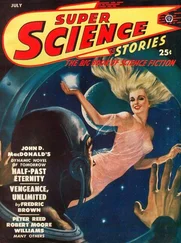Emotionally, she withdrew. She was a girl sitting beside him, sipping a cocktail. Physically she was there. But her mind had gone back into the past, and the look of sensitivity about her mouth twisted into something scornful and not fitting to her.
She said, “You sound like you wanted to know. It’s all a bit dull. I may tell you sometime, and watch you trying not to yawn. Maybe there’s no one on this earth who is the least bit interested except me. And I’m only interested now because the net result of being hurt is that I’m down here alone, trying to do work I’m not suited for, trying to think of what I should do next — trying to make a plan for my life that’ll make sense. I don’t make sense to myself these days.” She turned toward him and grinned. “Do all the people you meet start weeping on your shoulder?”
For a moment he dropped the pretense. He said, “Maybe we’re both at a crossroads. I’m doing work I’m not suited for, and I don’t know why I continue. It’ll soon be over and I have no plans.”
They were both silent for a few moments. He said suddenly, “Before this turns into a wake, we better have another drink.”
So they talked of New Orleans, of the tourist-consciousness of the French Quarter, of the proper Vermouth for martinis — discovered a mutual liking for frog’s legs, hot weather, Mozart and Duke Ellington. They were gay, and surprisingly young, and some of the ghosts left his eyes and the basement room took another backward step into the past.
But while they were talking, Charlebois crossed beyond the grillwork door a dozen times, and the man’s habitual way of walking, the angle of his head, the slope of his shoulders, were all indexed, recorded — filed in a compartment of Jan’s mind which was as still and cold as a starlit night on the steppes. And he discovered which set of tables were served by Jean Charlebois.
He offered her another drink and she said, “Just one more. That’ll finish me. Then you can lead me to a table.”
“The blind leading the blind, Jerry.”
The Ancient Door had filled up, and it was difficult for Jan Dalquist to estimate the proper interval which would give him assurance of getting one of Charlebois’s tables. He managed it. The headwaiter held the door open with a flourish, and Dalquist followed Jerry Ellis into the dining room, unobtrusively guiding her over to a table served by Charlebois.
When Charlebois came with the menus, Dalquist glanced up at him and said casually, in clipped Parisian, “I assume that you speak French?”
“Yes, monsieur,” Charlebois said. “Monsieur speaks very well.”
Dalquist glanced at Jerry Ellis, ascertaining from her puzzled expression that she didn’t speak the language. He said rapidly, “It is very crowded in here, and the young lady has no French. Have you not a quiet place where we might eat alone? With you to serve us?”
“One moment, monsieur.” Charlebois hurried off.
Jan turned to Jerry and said, “I’m sorry, but I just happened to think of it when the waiter came to the table. I asked him if there was a place where we could dine alone. I always feel conspicuous when the tables are so close and people can see my hands. I forgot that you might consider such a suggestion a little bold.”
“Don’t be silly,” she said quickly. “I’d love it. I hate being nudged by the elbows of the people at the next table.”
Charlebois was back in a few moments. He nodded to Dalquist and said, “One of the private rooms has not been reserved, monsieur. And I can serve you if you wish. Please follow me.”
They followed him through the curtains and up the narrow stairway to the second floor. With a flourish, he opened the door to a small room. It overlooked the courtyard. The moon — newly risen — shone through the open french doors and silvered a table for two set just inside the room. An ornate balcony overhung the court. When they were both in the room, Charlebois shut the door, hurried over to the table and lighted the two tall white candles. He held the chair for Jerry.
Jan said, “May I order for you?”
“Please do.”
Charlebois departed with the order, and as soon as he had shut the door silently behind him, Jerry began to laugh. She said, “Look at this den of wickedness! I had no idea they had these rooms up here. Moonlight. Candlelight. Huge divan. Draperies. It looks like a set I’ve seen in about six movies. My husband, if I had a husband, breaks in while we’re drinking a toast in champagne to the evening. I scream and you leap off the balcony. Or you shoot him. Or I shoot him. Or you shoot the waiter by mistake and I jump off the balcony. Why is it that there is so much less drama in real life?”
Dalquist was acutely conscious of the weight of the gun in the shoulder holster. He said, “As a matter of fact, I did order champagne. Now, accuse me of having delusions of drama.”
“I accuse you of being a man who never did a dramatic thing in his life, Jan. That’s why I like you. I’m desperately tired of dramatic people.”
Due to Charlebois’s downstairs responsibilities, the service was slow, but neither of them minded it. The candles flickered in the warm, fresh breeze. They talked of her painting, and she told him her only talent was good draftsmanship, that she couldn’t translate her emotions onto the canvas. At best, she could become only an adequate illustrator.
Jan told her of his life in prewar Paris, of the great automotive plant in which he had been a very junior engineer. How, somehow, the war, the destruction of men and machines through the application of very expert and very deadly mechanical engineering techniques, had soured him on his chosen profession.
When she asked him what he was doing, he said, “I’m an investigator for French capitalists who wish to build up foreign investments. I’m down here bloodhounding a deal for them. When it’s over, I’ll be through.”
“Then what?”
He shrugged. “Probably become a bloodhound for somebody else. I don’t know. I daydream a bit now and then. Always seem to picture myself as some sort of farmer. Green stuff growing all around me. Silly idea. Never tried to grow anything in my life.”
“I’m a farm gal,” she said. “Take me along with you to pick out the land, and I’ll give you a short course.”
She said it lightly, but their eyes met as she said it and something passed between the two of them — something frightening in its momentary intensity.
At that instant, Charlebois knocked on the door and entered on command.
Dalquist said rapidly, in French, “Bring us some brandy. Good brandy. And I suspect that the lady will leave me for a few moments. When she does, I wish to speak with you privately.”
“Oui, monsieur.” He brought back a tray with two glasses and a dusty, unopened bottle. He showed Dalquist the label, opened the bottle and poured the two glasses.
Jerry said, “Would you excuse me, please?”
Charlebois held the door for her and then came back into the room. He stood by the table and said, “Monsieur?”
Dalquist noticed the man staring at his hands. He moved them below the table level. “You have been very helpful. What is your name?”
“Pierre Duval, monsieur.”
“The young lady and I are very pleased. You impress me as being a man of tact and intelligence.” Charlebois made a small, self-effacing gesture. “I am unacquainted with New Orleans, Duval, and I desire to visit many interesting places with the young lady. You are doubtless well acquainted with the French Quarter. The young lady is a new acquaintance. You understand how such things are.” Dalquist chuckled in a man-to-man fashion. Charlebois laughed dutifully.
Dalquist continued. “At what time are you off duty here?”
Читать дальше
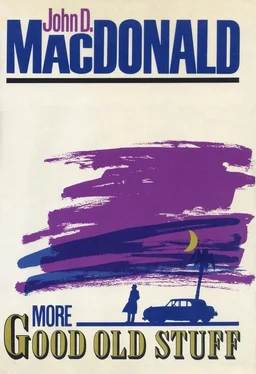
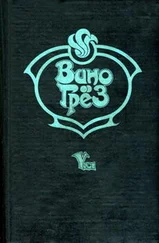

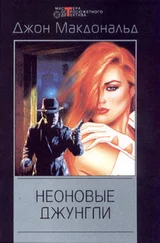
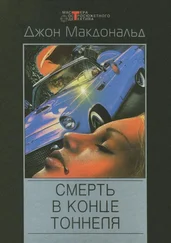




![Джон Макдональд - Wine of the Dreamers [= Planet of the Dreamers]](/books/430039/dzhon-makdonald-wine-of-the-dreamers-planet-of-thumb.webp)

